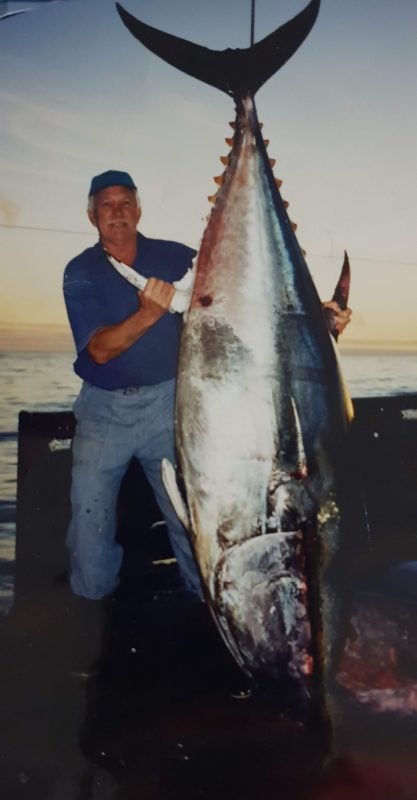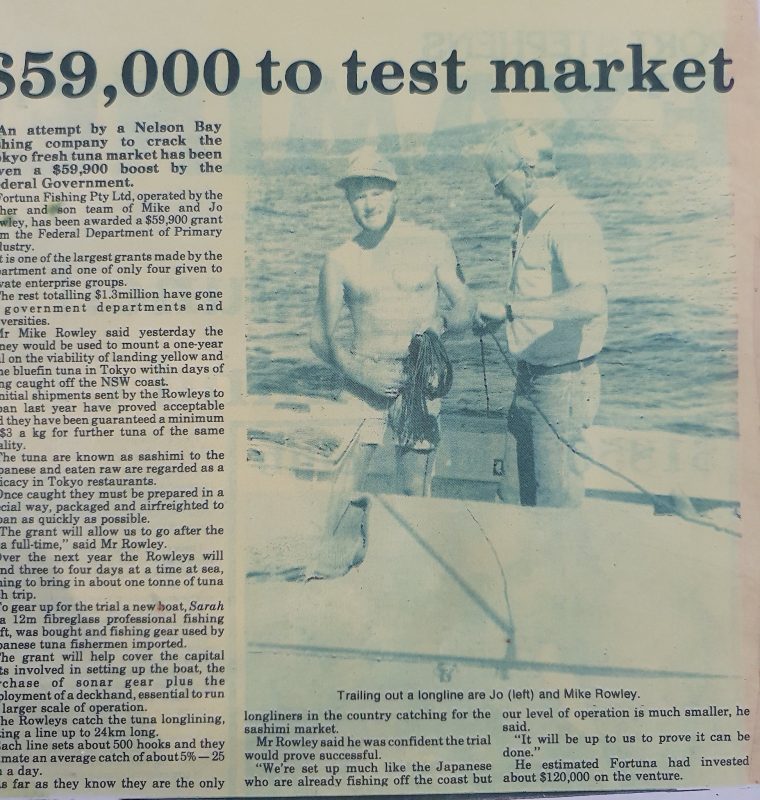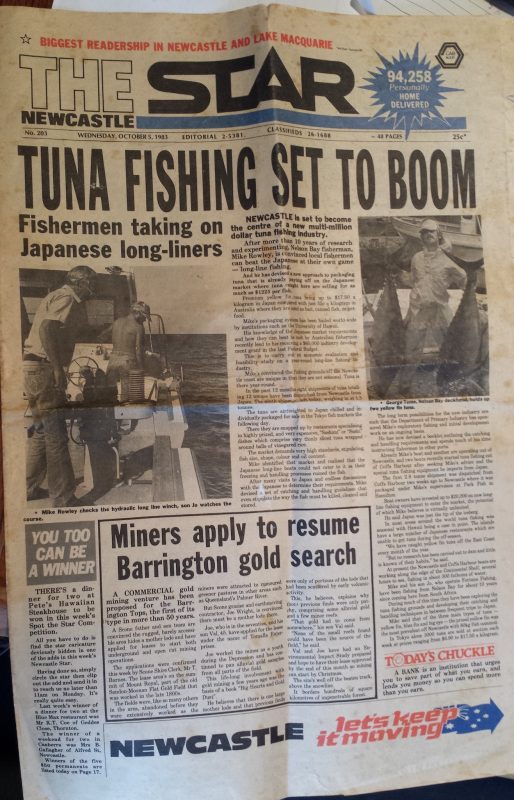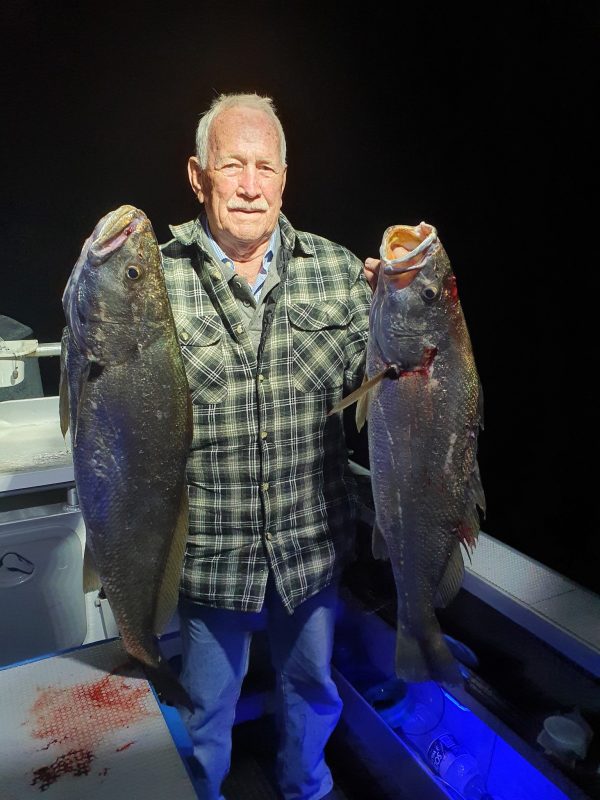Memories of fishing legend Mike Rowley
Commercial fisher Mike Rowley was a legend of the Eastern Tuna and Billfish Fishery. In this article, son Jo Rowley and Tuna Australia member Cathal Farrell, owner of Upscale Seafoods, reflect on Mike's many great achievements in his more than 60-year fishing career.
An innovator, big picture thinker, philanthropist, dear friend and all-round great bloke.
That’s how friends, relatives and colleagues remember fishing pioneer Mike Rowley, who passed away on 16 February 2022.

Mike Rowley with a 280 kg Northern Pacific Bluefin Tuna.
Mike was involved in fishing from a young age and remained active in the industry his whole life.
“After finishing school in South Africa [where his family moved after the war], Mike worked as a steward on a ship and then ran a marine and ship handling business,” said son Jo Rowley of Mike, who was born in 1933 in Middlesbrough, Yorkshire.
“He was also a keen fisherman.”
In the 1970s, Mike and his wife Francis decided to leave South Africa as they were concerned “there would be no future for their children.”
“My father believed Australia was the best option, and all you had to do was to work hard and you'd be successful,” said Jo.
“We arrived in January 1974 as a family of five carrying a suitcase each.”
An innovator and a philanthropist
In the 1980s, Mike got involved in the Australian tuna industry.
“At the time, the industry was dominated by the pole and line fishery, focusing on catching as much as possible to sell through the tuna canneries,” explained Cathal Farrell, owner of Upscale Seafoods.
“Mike explored new practices and markets, which positioned him to be the first Australian company to catch and export fresh chilled tuna to the lucrative Japanese market.”

The start of the sashimi tuna export industry, reported in an Port Stephens Examiner article in 1982.
Aside from developing new fishing practices and handling techniques, Mike created new systems to get his product to market.
“While initial exports were made in polystyrene boxes, Mike worked closely with packaging companies and developed the tuna coffin, which is still the standard used in this fishery.”
Cathal said that Mike was always “aware of the bigger picture.”
He had a hands-on approach, and his keen intellect just about assured his success in anything he put his mind to.
“In our industry, it is easy to follow trends, tinker around the edges and convince ourselves that what we’re doing is right because it’s always been done that way.”
With Mike, that was not the case.
“In the early days of the east coast longline fishery, he secured government funding to prove there was a viable fishery,” said Cathal.
“As result, Mike also helped others to set up export facilities, open markets and improve handling techniques.”
In the mid 1980s, Mike was instrumental in securing government funding to open up Nelson Bay Harbour to harness new opportunities.
“He had the vision to further explore the greater Australian fishing zone and commissioned two 24-metre purpose-built longline vessels for this purpose.”

'Tuna fishing set to boom', reports a 1983 article in The Star newspaper.
Cathal said that Mike could be “quite the philanthropist.”
“He regularly said to me, ‘I have principles—they are mine and I’ll use them when I want to.’”
One example of this was when Mike owned the only two commercial licenses for waters around Lord Howe Island.
“The fishing industry was going through a tough time as far as interactions with sea birds and turtles,” said Cathal.
“The negative aspect of the fishery needed to be countered, so Mike helped by gifting the two permits back to the islanders, which coincided with the island being granted World Heritage Status.”
A problem solver
Mike and his family moved to Cairns in the 1990s and set about pioneering the fishery.
“Mike and Jo developed new techniques, giving birth to deep set longlining in the fishery,” said Cathal.
It was Mike’s international experience and expertise that allowed them to succeed.”
Never ones to sit still, Mike and wife Francis moved to Mooloolaba, Queensland, in the late 1990s.
“At this stage, the fishery was in its infancy with only a couple of small vessels working the shelf.
“Success breeds success, and Mike’s success here was instrumental in its development, into the largest producing area and port in the fishery.”
Mike faced a huge number of obstacles getting his product off a boat and turning it into money.
“From establishing export facilities, import protocols into the USA and developing markets, all of this had to be put into place.
“Mike reveled in this and loved the challenge.”

Mike's fishing career began In Australia in the 70's, catching Jewfish.
Cathal met Mike and his wife Francis in the late 1990s, while still living in South Africa.
“I thank them for exposing me to the Eastern Tuna and Billfish Fishery and demonstrating a kindness and inclusiveness that led me to move to Australia with my family,” he said.
An inspiration
On 5 April 1998, the Melina T fishing vessel owned by a Rowley family company, Fortuna Seafoods, was involved in a collision with motor bulk carrier Eternal Wind.
The crash caused the Melina T to sink, and Fortuna Seafoods sued the Eternal Wind for the losses sustained.
“My father's belief in the case and unwavering faith in the legal system, and the Japanese owners’ and insurance company's unwillingness to compromise, saw the case taken to the High Court,” said Jo, who owns Deep Drop Commercial.
The judge ruled in Fortuna Seafoods' favour, resulting in an expansion of the potential liability of defendants.
“This set legal precedent in the High Court of Australia that set case law and is taught in universities to law students in the field of consequential damage.”
Another example of Mike’s sheer determination was when the Australian Fisheries Management Authority (AFMA) closed off the seamounts on the east coast in 2010.
This was a poorly thought-out attempt to protect Harrison's Dogfish, a species of ‘gulper shark’ being considered for threatened species listing, said Jo.
“We had been targeting Blue Eye Travella and avoiding the deep-water sharks since the late ‘80s.”
“So we offered to fund a project for AFMA to prove that our method did not impact the vulnerable shark species.
“AFMA found the funds after my father's offer to fund the project with CSIRO; such was his confidence in our technology, fishing knowledge and experience.”
The project findings proved that deep-drop fishing techniques did not affect shark populations.
“The project's success saw the re-opening of the seamount chain to our fishing method,” said Jo.
These examples give a taste of Mike’s “full and interesting life.”
“I was very lucky to have a father, business partner and mentor who supported me and allowed me to pursue my fishing career no matter where it took me,” said Jo.
Cathal added: “Mike was a wonderful source of information and inspiration, a dear friend and an all-round great bloke.”
Mike is survived by his wife of 70 years, three children, eight grandchildren and six great-grandchildren.